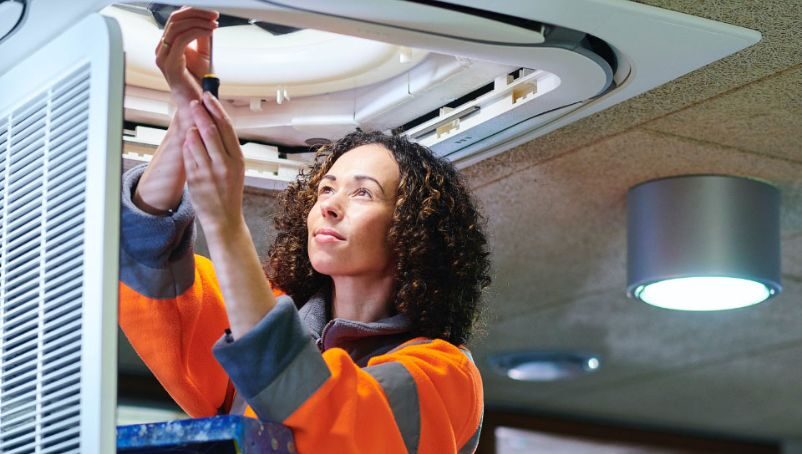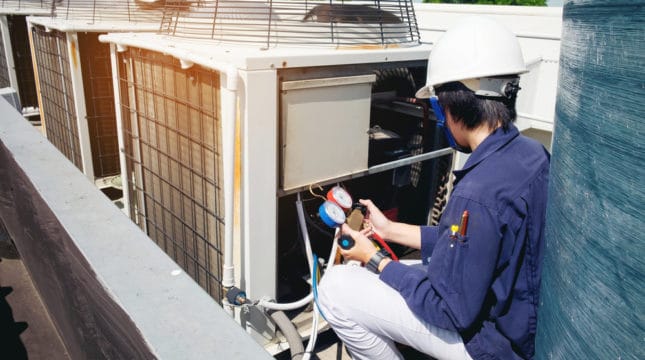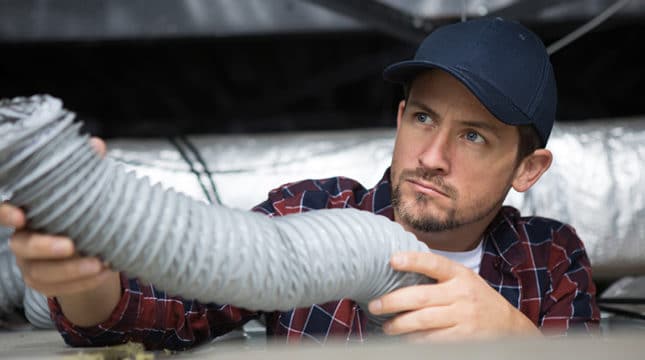What does a certified HVAC technician do?
“HVAC technician” is a general term for anyone who works on heating, ventilation and air conditioning equipment. But there are terms for people with different levels of HVAC qualifications, which affect what kind of work they can do.
These terms may vary by state, but in general:
- An HVAC apprentice is someone working in a supervised HVAC training program.
- An HVAC journeyman is an HVAC tech who has completed an apprenticeship and received a journeyman-level license, though they may not be a licensed contractor yet.
- An HVAC contractor, sometimes called an HVAC master, is an HVAC tech who has attained a contractor-level license. Usually, an HVAC contractor is able to oversee larger HVAC projects, which can include hiring other HVAC techs and getting permits from local officials.
Understand the requirements
Before you start the journey to becoming an HVAC tech it’s essential to know the rules where you live.
There’s no federal requirement to get an HVAC license or certification. But many states and localities require you to get an HVAC license before you can work as an HVAC contractor. Check the requirements here.
To get a license, you’ll usually have to take an exam and demonstrate a period of supervised work experience, which could be through an HVAC apprenticeship, trade school, or working as a “helper” for a licensed HVAC tech. You’ll also need to show proof of liability insurance.
Federal law does require HVAC techs to get an EPA certification, called a Section 608 certification. This trains you how to handle equipment that could release harmful refrigerants into the atmosphere. To get the 608 certification, you’ll have to pass an EPA-approved exam.
Later, you may consider getting additional optional certifications to further level up your HVAC career.
Choose an HVAC learning path
There are two ways to get HVAC skills: schooling and working. Techs often choose a combination of both.
In some states, you may be able to gain experience without a formal training program by simply working as a “helper” to a licensed HVAC contractor. But if your goal is to start your own HVAC business, it’s not a bad idea to pick up your skills in a more structured industry environment.
You can enroll in an accredited HVAC program, which offers entry level skills training, and can include preparation for the EPA 608 exam. These programs can take one to two years to complete, and may include some supervised work experience.
You may also opt for an HVAC apprenticeship, which involves as many as 8,000 hours — or four years — of supervised work in addition to classes. These apprenticeships are often run by HVAC industry organizations.
If your HVAC apprenticeship is offered by a union, the union may provide the classes for free.
When choosing a program, you may also want to consider whether it offers mentorship opportunities and job placement programs, so you can make sure you’re getting a good return on your investment.
Some HVAC programs are offered online. This can be great for saving money and learning at your own pace — but it likely won’t offer valuable hands-on experience or the same level of mentorship as an in-person program.
Pass the EPA Section 608 certification
There’s one certification that’s a must for any HVAC technician: the Environmental Protection Agency requires anyone who works with certain refrigerants to get certified under Section 608.
There are four different types of 608 certifications. Once you get a certificate, it doesn’t expire.
- Small appliances (Type I)
- High-pressure appliances (Type II)
- Low-pressure appliances (Type III)
- All equipment types (Universal)
Some HVAC schools may provide an opportunity to sit for an EPA certification exam. There are some organizations that offer short courses that are solely focused on the EPA certification and offer the exam at the end.
While that’s helpful for someone who needs to complete their requirements or get a different type of EPA certification, completing this exam alone is not enough to become a successful HVAC technician.
Apprentices don’t have to have EPA certification as long as their certified mentor closely watches over their work.
Get licensed
Once you have completed your HVAC apprenticeship or training program and passed your EPA certification, you’ll be able to take your state’s licensing exam, if that’s required. To get licensed, you’ll have to demonstrate proof of liability insurance.
Once you’ve met your area’s licensing requirements, you’ll be ready to work. To find an HVAC technician job, you may be able to get help through your school or apprenticeship’s career office. If you have worked under a mentor during your education, you can ask them if they can refer you to any organizations that are hiring.
Earn additional HVAC technician certifications
Even with a license, you may consider getting some additional HVAC technician certifications that can demonstrate your specialized HVAC knowledge to clients and open up new job opportunities. Common HVAC certification organizations include:
Start your own HVAC business
Once you have a few years of field experience as a licensed and certified HVAC technician, you may be able to apply for a HVAC contractor’s license, if your state requires one.
Typically, a licensed HVAC contractor may take charge of larger HVAC projects, and hire other HVAC technicians. A licensed HVAC contractor can also “pull permits,” which means getting permits from local officials for a project.
When you’re an HVAC contractor, you’ll need HVAC contractor insurance. This is a legal requirement in most states, and it’ll help protect you and your business in case something goes wrong during a job.






